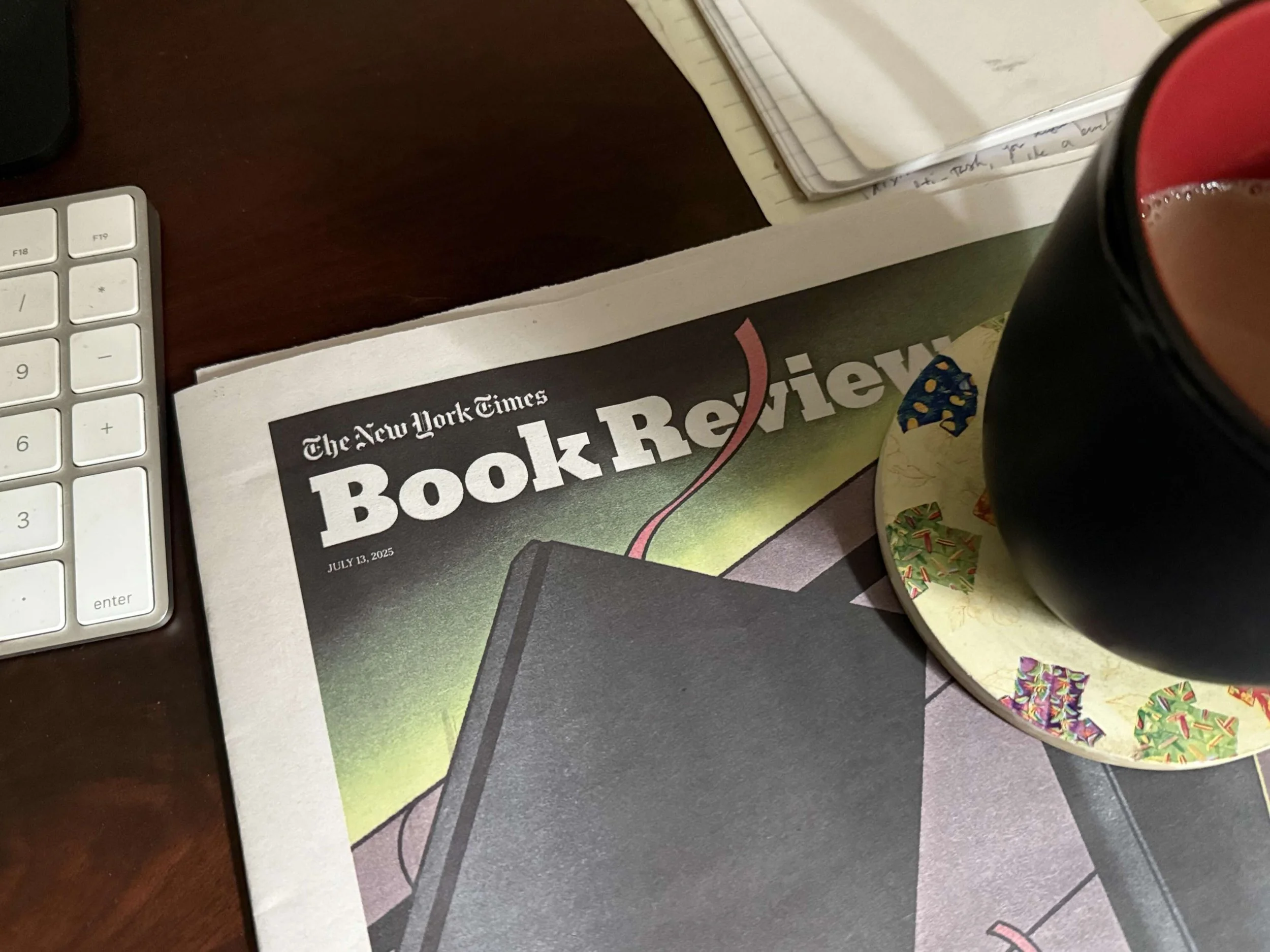If you’re wondering, this REALLY IS a hard copy section of the newspaper. To quote Thomas Jefferson, “I cannot live without books.”
I’m going to confess something here. Every single weekend I sacrifice trees and a measure of added carbon from the delivery driver’s vehicle exhaust to receive a physical copy of The Sunday New York Times. It’s a decadence I intend to indulge as long as possible. Most of my daily reading material is online these days, but not all. Six days a week my newspapers are online. They are, more accurately, news-apps and websites. Magazines, essays, blogs, newsletters: like you, I’m reading stuff on screens.
For books, I turn to hard copies. I like that they are immune to breakage, have no batteries, and resilient in the face of ordinary forces on ordinary days. I like having a physical reference point as to where I am in a text. The weight of a book in my hand becomes an embodied measure of my direct engagement with its contents. I actually have to hold a tangible thing to be involved with the more vital intangibility contained between its covers.
But back to reading a hard copy of The Sunday Times. The physicality of the experience is my gateway drug, and that’s why the first section I turn to every Sunday is inevitably The Book Review.
I’m old, I realize. Born in the ancient world of the 20th century, I’m not a digital native. Yes, yes, yes: I get this. Doesn’t matter that I make my living in the super-technical world of modern media, in the land of pixels and metrics and cloud-based data. Doesn’t matter that I’m even reasonably competent at life online. Whatever. Kids of today are cybernetic; I’m an arriviste. I earned my skills like a stranger in a strange land.
Reading books in physical form and reading The Book Review in physical form share certain obvious traits. But this section of the paper does something else for me that even reading a physical book doesn’t quite achieve. The Book Review aggregates a collection of contemporary thinkers who have spent more than just a a few minutes focused on a particular subject or narrative. To write a book means an author has typically labored to research, excavate, and shape what they want to say. It is a condensation of intense focus, and often a much deeper dive into a sliver of culture than any short-form anything. The Book Review, therefore, is a sober means for considering a range of intensely considered ideas, collected as a curated snapshot. Taken as a weekly folio, it becomes a pointillistic mural describing where we are as a culture. It’s not a complete view—not by any stretch. But as a smattering of thought that takes more than 15 seconds to consume (‘cause it’s not scrolling past your eyeballs on a phone screen), I find it a surprisingly good barometer, especially as content and styles morph from week to week.
You already know this, even if you’re not a Book Review habitué. The subjects it contains each week can range far and wide. Some reviewed books—and some of the reviews themselves!—are decidedly flamboyant, some academic, some somber, some ridiculous. Often there are reviews of writers I’ve never encountered before— most, in fact. Even if I’m not likely to read the actual book, just an encounter with its review reminds me that someone choose to spend months, perhaps years deeply immersed in a singular line of thought, and that will always pull my attention. I appreciate that focus. I respect it.
In The Book Review I get a scatter plot that reveals something in aggregate. Online, our endless scrolls present a constant cacophony of decontextualization. Online I may encounter a fizzy missive sent in from the front lines of—anywhere, really—and I may be held in temporary thrall not unlike a burst of sugar from a midday chocolate. But in the pages of the weekly Book Review, I have access to voices I simply might not find in my feed, and I often find something more nourishing, more lasting. I will not read most of the books I encounter there, but I like being part of the conversation about which books even exist in the first place, and where people may be placing their attention in terms of stories that matter to them.
Naturally, I am beholden to the editors. If they don’t publish it, I’m not going to see it. Matters regarding who has access, who has agency, who has boasting rights and a resulting boost into the limelight are enormous, and I realize that my view of the world of ideas is hardly an evenhanded one. But (confession again) I have decided for myself that in our frenetic world of over-saturated information, I’m leaning in to a certain level of trust that the NYT editors are thinking similarly. (I realize that vast swaths of the public might disagree, and I cannot rationally disagree with their reasons for being skeptical.)
Like you, I have limited waking hours to do anything. My electronic albatrosses weigh me down, even as I appreciate their obvious lifting capabilities. But for decades, I’ve looked to the Book Review to remind me that there are others in the world who’ve chosen to focus their own lives on intense pursuits of creative invention. When I read about their efforts, I feel connected to a great chain held together by optimism. By writing a book—any book—an author makes a definitive declaration:
I can still think.
I can still dream.

